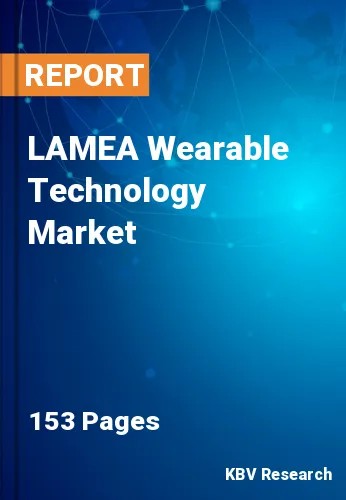Chapter 1. Market Scope & Methodology
1.1 Market Definition
1.2 Objectives
1.3 Market Scope
1.4 Segmentation
1.4.1 LAMEA Wearable Technology Market, by Device
1.4.2 LAMEA Wearable Technology Market, by Product Type
1.4.3 LAMEA Wearable Technology Market, by Application
1.4.4 LAMEA Wearable Technology Market, by Country
1.5 Methodology for the research
Chapter 2. Market at a Glance
2.1 Key Highlights
Chapter 3. Market Overview
3.1 Introduction
3.1.1 Overview
3.1.1.1 Market Composition and Scenario
3.2 Key Factors Impacting the Market
3.2.1 Market Drivers
3.2.2 Market Restraints
Chapter 4. Competition Analysis - Global
4.1 KBV Cardinal Matrix
4.2 Recent Industry Wide Strategic Developments
4.2.1 Partnerships, Collaborations and Agreements
4.2.2 Product Launches and Product Expansions
4.2.3 Acquisition and Mergers
4.3 Top Winning Strategies
4.3.1 Key Leading Strategies: Percentage Distribution (2019-2023)
4.3.2 Key Strategic Move: (Product Launches and Product Expansions: 2022, Aug– 2023, Sep) Leading Players
4.4 Porter’s Five Forces Analysis
Chapter 5. LAMEA Wearable Technology Market by Device
5.1 LAMEA Fitness Market by Country
5.2 LAMEA Smart Watches Market by Country
5.3 LAMEA Smart Glasses Market by Country
5.4 LAMEA Smart Clothing Market by Country
5.5 LAMEA Others Market by Country
Chapter 6. LAMEA Wearable Technology Market by Product Type
6.1 LAMEA Wrist Wear Market by Country
6.2 LAMEA Eyewear Market by Country
6.3 LAMEA Hearables Market by Country
6.4 LAMEA Neckwear Market by Country
6.5 LAMEA Bodywear Market by Country
6.6 LAMEA Others Market by Country
Chapter 7. LAMEA Wearable Technology Market by Application
7.1 LAMEA Fitness & Sports Market by Country
7.2 LAMEA Consumer Applications Market by Country
7.3 LAMEA Entertainment Market by Country
7.4 LAMEA Healthcare Market by Country
7.5 LAMEA Lifestyle Market by Country
7.6 LAMEA Defense Market by Country
7.7 LAMEA Enterprise Market by Country
Chapter 8. LAMEA Wearable Technology Market by Country
8.1 Brazil Wearable Technology Market
8.1.1 Brazil Wearable Technology Market by Device
8.1.2 Brazil Wearable Technology Market by Product Type
8.1.3 Brazil Wearable Technology Market by Application
8.2 Argentina Wearable Technology Market
8.2.1 Argentina Wearable Technology Market by Device
8.2.2 Argentina Wearable Technology Market by Product Type
8.2.3 Argentina Wearable Technology Market by Application
8.3 UAE Wearable Technology Market
8.3.1 UAE Wearable Technology Market by Device
8.3.2 UAE Wearable Technology Market by Product Type
8.3.3 UAE Wearable Technology Market by Application
8.4 Saudi Arabia Wearable Technology Market
8.4.1 Saudi Arabia Wearable Technology Market by Device
8.4.2 Saudi Arabia Wearable Technology Market by Product Type
8.4.3 Saudi Arabia Wearable Technology Market by Application
8.5 South Africa Wearable Technology Market
8.5.1 South Africa Wearable Technology Market by Device
8.5.2 South Africa Wearable Technology Market by Product Type
8.5.3 South Africa Wearable Technology Market by Application
8.6 Nigeria Wearable Technology Market
8.6.1 Nigeria Wearable Technology Market by Device
8.6.2 Nigeria Wearable Technology Market by Product Type
8.6.3 Nigeria Wearable Technology Market by Application
8.7 Rest of LAMEA Wearable Technology Market
8.7.1 Rest of LAMEA Wearable Technology Market by Device
8.7.2 Rest of LAMEA Wearable Technology Market by Product Type
8.7.3 Rest of LAMEA Wearable Technology Market by Application
Chapter 9. Company Profiles
9.1 Apple, Inc.
9.1.1 Company Overview
9.1.2 Financial Analysis
9.1.3 Regional Analysis
9.1.4 Research & Development Expense
9.1.5 Recent strategies and developments:
9.1.5.1 Product Launches and Product Expansions:
9.1.6 SWOT Analysis
9.2 Samsung Electronics Co., Ltd. (Samsung Group)
9.2.1 Company Overview
9.2.2 Financial Analysis
9.2.3 Segmental and Regional Analysis
9.2.4 Recent strategies and developments:
9.2.4.1 Product Launches and Product Expansions:
9.2.5 SWOT Analysis
9.3 Sony Corporation
9.3.1 Company Overview
9.3.2 Financial Analysis
9.3.3 Segmental and Regional Analysis
9.3.4 Research & Development Expenses
9.3.5 Recent strategies and developments:
9.3.5.1 Partnerships, Collaborations, and Agreements:
9.3.5.2 Product Launches and Product Expansions:
9.3.6 SWOT Analysis
9.4 Garmin Ltd.
9.4.1 Company Overview
9.4.2 Financial Analysis
9.4.3 Segmental and Regional Analysis
9.4.4 Research & Development Expenses
9.4.5 Recent strategies and developments:
9.4.5.1 Product Launches and Product Expansions:
9.4.6 SWOT Analysis
9.5 Motorola Solutions, Inc.
9.5.1 Company Overview
9.5.2 Financial Analysis
9.5.3 Regional & Segmental Analysis
9.5.4 Research & Development Expenses
9.5.5 Recent strategies and developments:
9.5.5.1 Product Launches and Product Expansions:
9.6 Fitbit, Inc (Google LLC)
9.6.1 Company Overview
9.6.2 Financial Analysis
9.6.3 Segmental and Regional Analysis
9.6.4 Research & Development Expense
9.6.5 Recent strategies and developments:
9.6.5.1 Partnerships, Collaborations, and Agreements:
9.6.5.2 Product Launches and Product Expansions:
9.6.6 SWOT Analysis
9.7 Nike, Inc.
9.7.1 Company Overview
9.7.2 Financial Analysis
9.7.3 Segmental Analysis
9.7.4 Recent strategies and developments:
9.7.4.1 Product Launches and Product Expansions:
9.7.4.2 Acquisition and Mergers:
9.7.5 SWOT Analysis
9.8 Adidas AG
9.8.1 Company Overview
9.8.2 Financial Analysis
9.8.3 Regional Analysis
9.8.4 Research & Development Expense
9.8.5 SWOT Analysis
9.9 LG Electronics, Inc. (LG Corporation)
9.9.1 Company Overview
9.9.2 Financial Analysis
9.9.3 Regional & Segmental Analysis
9.9.4 Research & Development Expenses
9.9.5 Recent strategies and developments:
9.9.5.1 Product Launches and Product Expansions:
9.9.6 SWOT Analysis
9.10. Huawei Technologies Co., Ltd. (Huawei Investment & Holding Co., Ltd.)
9.10.1 Company Overview
9.10.2 Financial Analysis
9.10.3 Segmental and Regional Analysis
9.10.4 Research & Development Expense
9.10.5 Recent strategies and developments:
9.10.5.1 Product Launches and Product Expansions:
9.10.6 SWOT Analysis

